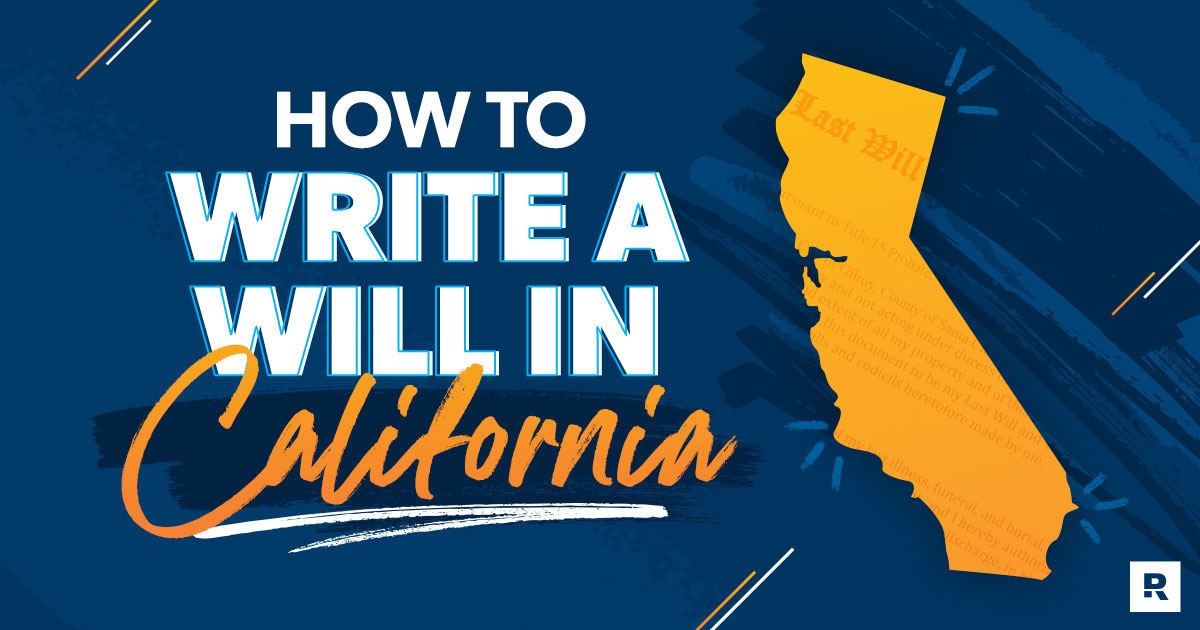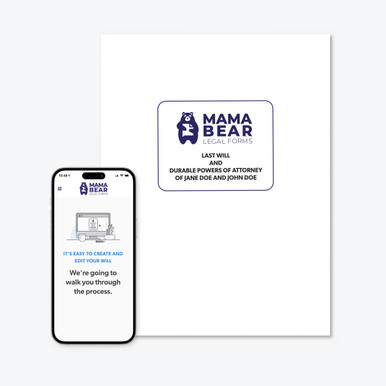
Congratulations! You made the smart decision to protect your loved ones and write your will. We know it’s not an easy decision, and you may have lots of questions. So, we put together step-by-step instructions for making your will in California super easy.
- Decide Which Assets to Include in Your Will
- Decide Who Will Inherit Your Assets
- Choose a Guardian for Your Children
- Choose an Executor
- Make Your Will
- Sign Your Will in Front of Witnesses
- Store Your Will in a Safe Place
- California Will FAQs
1. Decide Which Assets to Include in Your Will
The first thing to do is think specifically about each one of your assets—the stuff you own that has value. You’ll need to make a list of the ones you know you want to include in your will. Here’s a list of examples to get you started:
- Property (residential and commercial)
- Life insurance policies
- Bank and retirement accounts
- Cars
- Pets
- Hobby assets (e.g., stamps, rare books collection, etc.)
- That special surfboard you used to surf the beautiful California coastline (or guitar or whatever) that you know isn’t financially valuable but has sentimental meaning—include that too
Once you have your list, fill in specific details like property address(es), purchase dates, account numbers, contact details, pet names, etc. Flesh out as much detailed information as you can. Write down everything you think your executor (the person who manages your will when you’re gone) will need to carry out your wishes.
Save 10% on your will with the RAMSEY10 promo code.
Here’s a useful tip: The more details you can collect now, the easier it will be to just copy and paste all that information when it’s time to actually create your will.
If you’re thinking this sounds like a lot of hassle, and you’re starting to rethink your decision to make a will—stop! All adults need a will. The most important reason to have a will is to keep your loved ones from dealing with a mess after you’re gone.
Here’s the deal: If you die without a will, there’s no guarantee your belongings will end up where you want them to. You’re leaving it up to the courts to decide all that. And if you have kids, you’re leaving it up to the courts to decide who takes care of them (more on that below)!
As odd as it may sound, dealing with all these details now is one of the best ways to show your family how much you care. Remember, they’ll already be grieving your loss—and knowing you took the time to make the management of your assets easy for them will mean so much.
Okay, let’s get back to walking through exactly how to make a will in California.
Don't Know Where to Start With a Will?
Download our will worksheet to get started.
2. Decide Who Will Inherit Your Assets
Next, you’ll need to decide the beneficiaries—the people who will get your assets. If your spouse is still living and you want to give everything to them, this part is easy. Here’s why.
California is a community-property state. That means that all assets you or your spouse acquired during your marriage belong to both of you equally. So, if your spouse survives you, they’re entitled to 100% of the community property.
For separate property—those are assets you bought before you were married—the state will divide those up between your surviving relatives if you don’t have a will. Yet another reason to check a will off your to-do list.
But if your spouse passes away before you, you’ll need to think about how you would divide up your assets. For example, you could leave an equal percentage or a specific dollar amount to each of your children. Or you could leave everything to charity. It’s totally up to you.
Keep in mind that if you own a home with your spouse or someone else, the property automatically goes to the person named in the real estate deed—a will does not overrule who gets the property. The same rule applies to life insurance policies and retirement accounts—your California will does not override the person who’s named as a beneficiary on a life insurance policy or on a retirement account.
3. Choose a Guardian for Your Children
This one can tug on a lot of heartstrings—think about your decisions carefully.
If you have minor children, the last thing you want is for the courts to make decisions about your kids for you. Don’t let a stranger decide what’s best for your kids. Name their guardian(s) in your will.
Just to be clear, guardians are the people who would have legal custody of your kids and your kid’s property if you’re gone. Guardians should be people you trust (duh!), and you should talk to the people you’re considering as guardians first to make sure they agree with your decision. You can also name an alternate guardian in case your first choice doesn’t work out.
Whatever you decide, be sure to give that person access and authority to work with any insurance or savings accounts you’ve set up for your kids, and write down all the details your kids’ guardian(s) will need.
4. Choose an Executor
Another part of learning how to make a will in California is understanding how to pick an executor. An executor is the person who makes sure all the wishes inside your will are met. They also use the funds in your estate to pay any debts that you have left.
One of the many responsibilities (make sure you pick someone who has free time!) of an executor is to file the will with the county probate court before the deadline.
In California, executors must file the will within 30 days of the death of the person who made the will.1 Even if probate isn’t necessary, the executor must still file the will with the probate court in the deceased’s county.
Ideally, the executor files (aka lodges) the will in the court of the California county where the person who made the will resided at the time of death. To make it easy, we put together an alphabetical list of the 58 superior courts for each county in California with a link to specific probate court details for that county:
After the executor files your will with the appropriate county court, the court will then validate the will and authorize the executor to oversee the estate.
5. Make Your Will
Online wills have come a long way in the last few years. In the past, your only option was to either write your will yourself or pay an attorney to work with you.
Thanks to the internet, it’s now possible to make a legal, comprehensive will online. Most people just need to fill in a few blank fields on a digital form to generate a valid will in minutes.
Here’s a side note: The reason we’ve been nagging you throughout this article to write down specific details for the steps we’ve discussed so far (information about assets, beneficiaries and guardians) is because we want to make this process as easy as possible for you. When it’s time to actually make your will, if you’ve already written down details, you’ll have all the information you need right at your fingertips.
Nice!
Will an online will work for you?
Find out if an online will works for you in less than 5 minutes.
6. Sign Your Will in Front of Witnesses
After you’ve created your will, the next step to make it legal in California is for you to sign it in front of two witnesses. Technically, under California law, it can be signed by someone else on your behalf, but to avoid potential challenges to your will, if you’re physically and mentally able, sign it yourself.
Now about those two witnesses. They need to be present at the same time and they need to sign the will after you do. They also need to be disinterested witnesses.
What’s a disinterested witness? It just means that they can’t gain anything by agreeing to be witnesses for your will. So, you can’t take them out to dinner to ask them to be your witness, and you can’t leave them any gifts in your will. Sorry.
To really cover your bases, get your will notarized. It can speed up your probate process and save some headaches for your witnesses and loved ones. Notarization isn’t required in California—but it’s a good idea.
If you’re eager to learn more, we wrote an entire article about California's last will and testament requirements.
7. Store Your Will in a Safe Place
Once you create your will and sign it, you need to store it in a safe place. It’s completely up to you where you store your will, but make sure you tell at least one other person where it is. Your legal California will won’t mean anything to anybody if no one can find it.
To avoid forgetting to tell someone or misplacing your will, Ramsey recommends storing all your important paperwork in what we call a legacy drawer. A legacy drawer is basically a physical drawer—not a folder on your computer—that holds all of the information your family needs if something happens to you.
Even though we live in a digital world, knowing your will is in a safe place physically—instead of on a cloud drive somewhere on the outskirts of the internet—can bring a lot more peace of mind for you now and for your loved ones when you’re gone.
Interested in learning more about estate planning?
Sign up to receive helpful guidance and tools.
Make Your California Will
The smartest and most cost-effective way to make your will is to do it online. If you’ve already gathered the important details we discussed in this article, we recommend taking the next step and using RamseyTrusted provider Mama Bear Legal Forms to create an online, state-specific, attorney-designed will tailored to your needs.
Remember the reason you're doing this: Making a will protects those you love at a time when they’re grieving your loss and needing your help.
Next Steps
- Still not sold on needing a will? Learn what happens if you die without one.
- Take our quiz to figure out if an online will works for you.
- Grab this worksheet to know what you need to create your will.
- Make a list of the assets you want to include in your will.
- Decide who your beneficiaries will be.
- Pick someone to be your executor.
- Start your California-specific online will with RamseyTrusted provider Mama Bear Legal Forms.
Complete Last Will Package for Married Couples
Complete Last Will Package for Individuals
California Will FAQs
What happens if I don’t have a will in California?
Dying without a will is called intestacy. If you die intestate, the state takes over and decides what and how your assets are distributed. Don’t die without a will!
There is an established hierarchy of relatives that California uses for intestate succession, but counting on this can be a big mistake. Here’s why.
First, you might not agree with the state’s choices. And second, if you don’t have any living relatives by blood or by marriage when you die, the state takes your property. Ouch!
How much is the inheritance tax in California?
Good news here. California does not collect an inheritance tax.
Do California wills have to be notarized?
Good news again. For wills to be legal in California, notarization is not required. Even though notarization isn’t legally required, we recommend it anyway.
Are handwritten wills legal in California?
Yes,in California, holographic wills (aka handwritten wills) are legal in California. And while it’s true that a handwritten will is better than no will at all, ideally you should make your will way before you have to make last-minute decisions on a handwritten will.
Can I revoke or change my California will?
In California, you can either revoke or change your will at any time before you die.
Revoking a will means that you’re nullifying it by burning, tearing, shredding, deleting or otherwise getting rid of your will with the purpose of cancelling it.
Changing a will means that you’re executing a codicil (just a fancy legal term for a document that updates a will) to replace the terms of the original will. To put it simply, you can’t just randomly cross out a few words and add handwritten corrections—you need to use a codicil to make your changes.
Life happens, and adjustments are necessary. We get that. But to comply with California law, the codicil must be executed with the same requirements as the original will (basically, everything we’ve discussed in this article).
Do I need a lawyer to make a will?
No, you don’t need a lawyer to make a will in California. Unless your situation is super complicated (take our quick quiz to find out if you need a lawyer), you can either use a downloadable template, or you can use simple, software-driven online forms written by attorneys.





